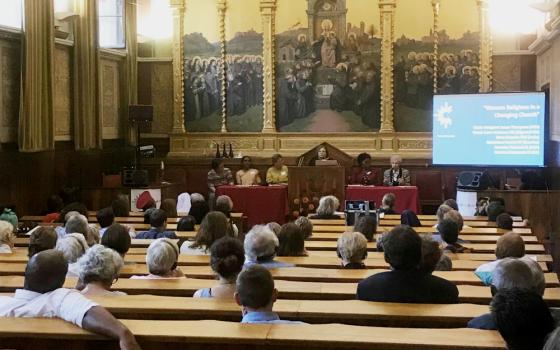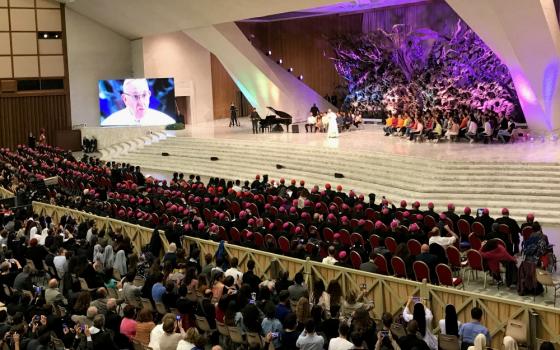As the Synod of Bishops on "young people, faith and vocational discernment" got underway at the Vatican at the beginning of October, a symposium and book launch about women in the church was happening nearby at the Pontifical University Antonianum.
More than 100 people, mostly women of all ages from nations around the globe, packed into one of the auditoriums. Catholic Women Speak, a global network of more than a thousand Catholic women, sponsored the event to launch its new book, Visions and Vocations, an anthology of contributions from about 50 women. Edited by theologian Tina Beattie and scholar Diana Culbertson, a Dominican Sister of Peace, the book explores the synod theme from various cultural, theological and personal experiences.
A smattering of the women contributors formed the backbone of the symposium, with talks, panel discussions, poems, music and a performance called "The Three-Legged Cooking Pot" about the culture of women and Catholicism in southern Africa.
Young girls from Ursuline High School in Wimbledon, England, read excerpts from their "Letter to Pope Francis — From Ten Young Catholic Women, Ages 14-17," in which they say that because women were the first evangelists, the Church must "offer female role models ... and hear the voices of women everywhere."
I felt my intellect and senses enriched, perhaps overwhelmed, even before the lively discussion on "Women and Priests in Conversation" and the panel on culture about the Catholic situation in Pakistan, Sierra Leone, Jamaica, Poland, Bolivia and the United States.
Quite naturally, the panel of most interest to me was "Women Religious in a Changing Church." As one of the panelists, I was asked to share my vision for vocation in religious life in the 21st century and how that vision has evolved based on my life experience in mission and ministry.
Similar to most U.S. women religious today, my vision of religious life was rooted in the mid-20th century, in a culture in which the institutional Catholic Church was like a public billboard announcing Christ's message to the world. In the minds of Catholics, "the church" meant "God." When "the church spoke," that meant "God spoke."
From the age of 7, I felt God calling me to religious life. I was brimming with love for God and wanted to let people know of God's great love for them. I yearned to be a reflection, a conduit, a channel of God's love, but not by standing on a street corner and preaching the message. I believed, and still do, that my identification as a nun, as a part of the institutional church, would remind people of God. Being a nun was a neon light that blinked the message "God loves you."
At graduate school, I met gay and lesbian Catholics whose lives had been devastated by dire rebukes of going to hell as they were thrown out of the confessional. The leaders of my congregation, the School Sisters of Notre Dame, were women of vision and compassion, who believed that God's love must be shown to a group too long neglected in our church; so I was assigned to full-time lesbian and gay ministry in 1977. (Forty years ago, there was no public consciousness in the church of transgender people.)
My vision of religious life was transformed, perhaps revolutionized, by the gender politics I subsequently experienced. My diocesan bishop notified all U.S. bishops of his disapproval of my ministry, but when my provincial asked the U.S. Catholic Conference to inform bishops about the community's approval, her letter was never sent.
This is the lack of power that women in the church suffered decades ago and, unfortunately, still do today. While bishops have canonical jurisdiction over ministries in their dioceses, religious communities have been the prophetic voice of the church. When prophecy and canon law collide, respectful dialogue is needed in order to arrive at some mutual agreement.
Instead, my diocesan bishop contacted the Congregation for the Doctrine of the Faith to request "pressure" on my "superiors" to remove me from the ministry. On three occasions, the Vatican requested that my community leadership investigate the ministry and recommend sanctions; on each occasion, my community leaders responded with a positive evaluation.
Without explanation, the Vatican disregarded their findings and, in so doing, ignored the principle of subsidiarity. Once again, a simple dismissal of women's decisions. The only reply was the appointment of a Vatican commission, which decided in 1999 that I should end my ministry. After a year of prayer and reflection, I chose not to collaborate in my own oppression, because the process had been remarkably flawed.
Fifteen years later, Pope Francis gave special VIP seating to an LGBT delegation I brought to a papal audience, but the church deserves a governance system that does not depend on the benevolence of males. The hierarchical system needs to respect the full and equal participation of women in all aspects of ecclesial affairs, including governance.
The current Vatican philosophy that uses the shibboleth "feminine genius" to confine women to caring and nurturing ministries and to limit their participation in certain ecclesiastical roles such as priesthood needs to be replaced by one that makes church functions or positions gender-neutral.
Women's experience, opinions and perspectives need to be taken seriously, particularly in conflicts regarding the ministerial life of the church. Women have learned that dialogue, discussion and prayer can lead to building consensus in arriving at a decision. We can look to the story of the Leadership Conference of Women Religious during the six-year investigation by the Congregation for the Doctrine of the Faith (2009-2015) to see that this is possible.
I want to encourage the observers at the youth synod, and all others, who are contemplating a vocation to religious life to pursue their discernment. Religious life today is still a call to love God and to serve as a channel of God's love. Religious life in the 21st century is also a call to help our church listen to the voices of women as we remind the institution what it was founded for.
[Jeannine Gramick is a Sister of Loretto who has been involved in a pastoral ministry for lesbian and gay Catholics since 1971. She co-founded New Ways Ministry and has been an executive coordinator of the National Coalition of American Nuns since 2003.]


